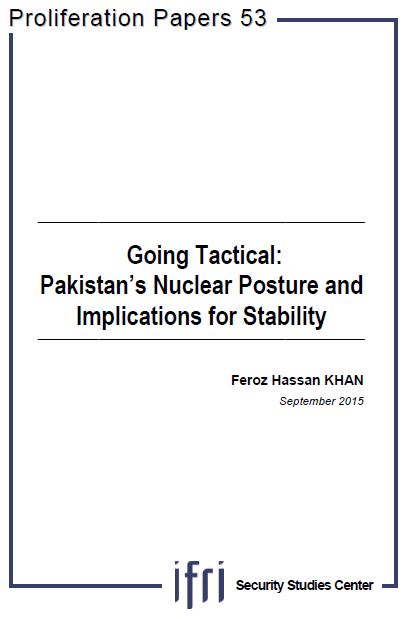Going Tactical: Pakistan’s Nuclear Posture and Implications for Stability

For decades, the Asian security environment has been characterized by multiple strategic rivalries with cascading effects.
Due to its competition with China, India modernizes its armed forces, thus reinforcing its conventional advantage over Pakistan. In the subcontinent, geography, military imbalance, the legacy of past conflicts and infiltration of extremist groups considerably weaken strategic stability. To strengthen its deterrent capability against its stronger neighbour, Pakistan faces significant challenges in developing a conventional response to perceived threats from India. Islamabad thus committed to a “full spectrum” build-up of its nuclear forces, which includes the development of tactical nuclear weapons. As Cold War experience informs, far from simply strengthening its deterrent vis-a-vis India, this move poses numerous operational dilemmas for Pakistan. The ongoing regional quantitative and qualitative arms race combines with continued political tensions between India and Pakistan to create a worrying strategic dynamic in South Asia.
Download the full analysis
This page contains only a summary of our work. If you would like to have access to all the information from our research on the subject, you can download the full version in PDF format.
Going Tactical: Pakistan’s Nuclear Posture and Implications for Stability
Related centers and programs
Discover our other research centers and programsFind out more
Discover all our analysesMain Battle Tank: Obsolescence or Renaissance?
Since February 2022, Russian and Ukrainian forces combined have lost more than 5,000 battle tanks, a much higher volume than all the European armor combined. Spearhead of the Soviet doctrine from which the two belligerents came, tanks were deployed in large numbers from the first day and proved to be a prime target for UAVs that became more numerous and efficient over the months. The large number of UAV strike videos against tanks has also led a certain number of observers to conclude, once again, that armor is obsolete on a modern battlefield. This approach must, however, be nuanced by a deeper study of the losses and their origin, UAVs rarely being the sole origin of the loss itself, often caused by a combination of factors such as mines, artillery or other anti-tank weapons.
Mapping the MilTech War: Eight Lessons from Ukraine’s Battlefield
This report maps out the evolution of key technologies that have emerged or developed in the last 4 years of the war in Ukraine. Its goal is to derive the lessons the North Atlantic Treaty Organization (NATO) could learn to strengthen its defensive capabilities and prepare for modern war, which is large-scale and conventional in nature.
"Iron Swords" A Military Analysis of Israel's War in Gaza
On October 7, 2023, Hamas' attack, dubbed “Al-Aqsa Flood,” caused a major shock and led Israel to launch the longest war in its history. Operation “Iron Swords” was notable for its unprecedented intensity, both in terms of the massive ground forces deployed and the firepower used.
Saudi Arabia’s Nuclear Temptations. Lessons Learned from Regional Instability
Saudi Arabia’s integration in the international arena and regional stability, notably through reducing its dependence on fossil energies, are crucial elements for the success of the Kingdom’s Vision 2030, the Crown Prince’s top priority. However, Mohammed bin Salman’s declarations in 2018 and 2021, indicating that “if Iran develops a nuclear bomb, we will follow suit as soon as possible”, combined with the recent strikes on key Iranian nuclear facilities, do not bode well for the future of the Kingdom, the region and the non-proliferation regime at large.











